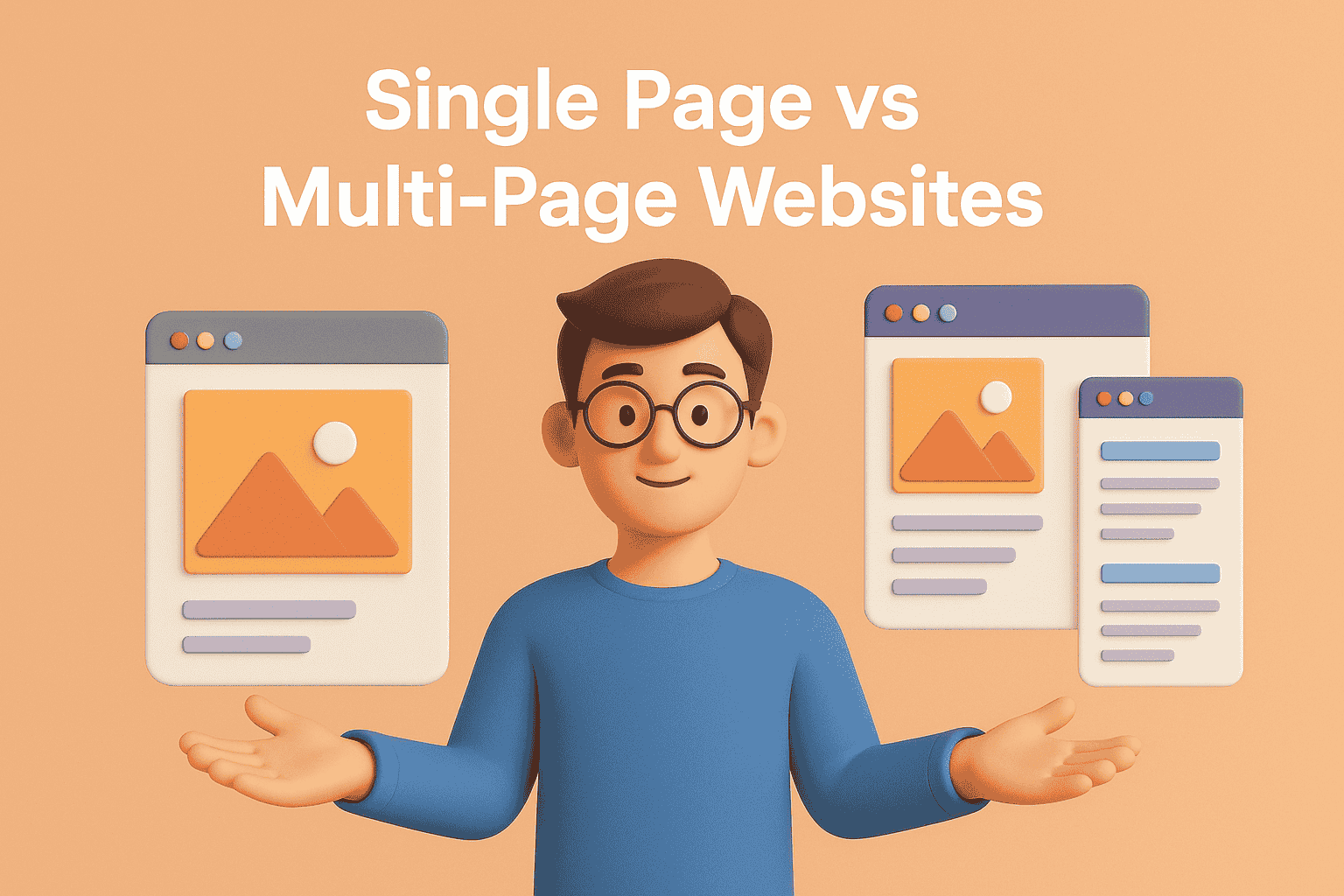
Single Page vs Multi-Page Websites
Your website is often the first interaction your customers will have with your brand. Whether you are a startup founder in Mumbai preparing to launch your first product or an agency client looking to upgrade digital presence, the type of website structure you choose can make or break your online growth.
One of the most common questions business owners face is:
Should I go with a single-page website or a multi-page website?
At Intellitron Genesis, we work with businesses across industries, helping them select digital strategies that not only attract visitors but also convert them into loyal customers. In this article, we’ll dive deep into the differences between single-page and multi-page websites, their pros and cons, their impact on SEO, and which one fits your business goals best.
What is a Single Page Website?
A single-page website consolidates all its content—such as services, about, testimonials, and contact details—onto one continuous page. Instead of clicking through different sections, visitors simply scroll or use anchor links that jump them to different areas of the same page.
Benefits of Single Page Websites
- Clean, Minimal Design – Perfect for startups that want a modern and simple brand presence.
- Mobile-First Friendly – With mobile usage dominating web traffic, single-page sites work well on smaller screens where scrolling feels natural.
- Streamlined Storytelling – The structure allows businesses to present their brand story in a controlled, linear flow.
- Faster to Develop – Launching a single-page site takes less time and investment, making it appealing for MVPs or businesses testing an idea quickly.
Limitations of Single Page Websites
- Limited SEO Opportunities – With just one page, there are fewer chances to rank for multiple keywords, which restricts organic growth.
- Scalability Issues – As a business grows, adding new services or products can clutter the single-page format.
- Analytics & Tracking Challenges – It can be harder to analyze user behavior since everything is compressed into one page.
What is a Multi-Page Website?
A multi-page website is structured with multiple interconnected pages such as Home, About, Services, Blog, and Contact. This structure is common for established brands, e-commerce platforms, and businesses looking for strong SEO growth.
Benefits of Multi-Page Websites
- Stronger SEO Advantage – Each page can be optimized for specific keywords (e.g., “digital marketing in Mumbai,” “custom app development,” or “e-commerce solutions”), allowing wider visibility.
- Scalable & Flexible – Easy to add new pages as your business expands into new products, services, or locations.
- Improved Navigation – Visitors can find exactly what they need without scrolling endlessly.
- Better Content Marketing – Having a blog section allows businesses to post regular articles, which supports long-term SEO growth.
Limitations of Multi-Page Websites
- Longer Development Timelines – More pages mean more design, content, and development time.
- Higher Initial Investment – Requires more resources compared to a single-page site.
- Risk of Poor Navigation – If not designed properly, too many pages can overwhelm users.
Single Page vs Multi-Page: Which is Right for You?
The choice between single-page and multi-page websites depends on your business goals, budget, and digital roadmap.
- For Startup Founders in Mumbai: A single-page website is often sufficient if you need a quick, cost-effective launch. It creates a neat online presence that can impress investors and early customers without heavy development costs.
- For Agencies & Growth-Focused Businesses: A multi-page website is better suited since it allows SEO expansion, advanced marketing campaigns, and long-term scalability.
For example, if you plan to run Google Ads, blog campaigns, or location-based SEO targeting across multiple regions, a multi-page structure gives you much more flexibility.
SEO Perspective: Local and Global Growth
From an SEO perspective, multi-page websites nearly always outperform single-page sites. Why? Because each page is an opportunity to rank for different keywords.
- A startup in Mumbai might want to rank for “branding agency in Mumbai,” “digital strategy consultant in Mumbai,” and “startup website development.”
- With a single-page site, it’s difficult to target all these keywords effectively. A multi-page site, however, allows each service or topic to have its own optimized page.
Additionally, multi-page websites are essential for blogging. Regular blogs not only attract organic traffic but also position your brand as a thought leader.
Explore more SEO insights here:
- Why Your Website Should Be Mobile-First
- How Voice Search Is Gaining Users – What SEO Teams and Businesses Need to Know
User Experience Considerations
Beyond SEO, user experience plays a critical role:
- Single-Page UX: Best for quick interactions where visitors only need essential information like your story, services, and contact details. Great for small businesses, events, or portfolio websites.
- Multi-Page UX: Best for businesses that offer multiple services or products, need a content hub, or expect users to explore deeper into the website.
Future Scalability
Think long-term. A website is not just a design asset—it’s a business growth platform.
- A single-page website might meet your needs today, but when you add new services, blog articles, or customer case studies, it can quickly feel restrictive.
- A multi-page website, on the other hand, provides a strong foundation for growth, allowing you to expand without overhauling the entire site.
Final Thoughts
When it comes to Single Page vs Multi-Page Websites, the decision depends on where your business is today and where you want it to go tomorrow.
- Single Page Websites are lean, modern, and effective for startups looking for speed and simplicity.
- Multi-Page Websites are robust, scalable, and essential for businesses focused on long-term SEO visibility and digital marketing campaigns.
At Intellitron Genesis, we have helped startup founders in Mumbai and global agency clients decide on the right website architecture that not only represents their brand but also maximizes growth opportunities.
If you are planning to build or upgrade your website, explore our blog page for more insights or connect with us to get a tailored consultation.
